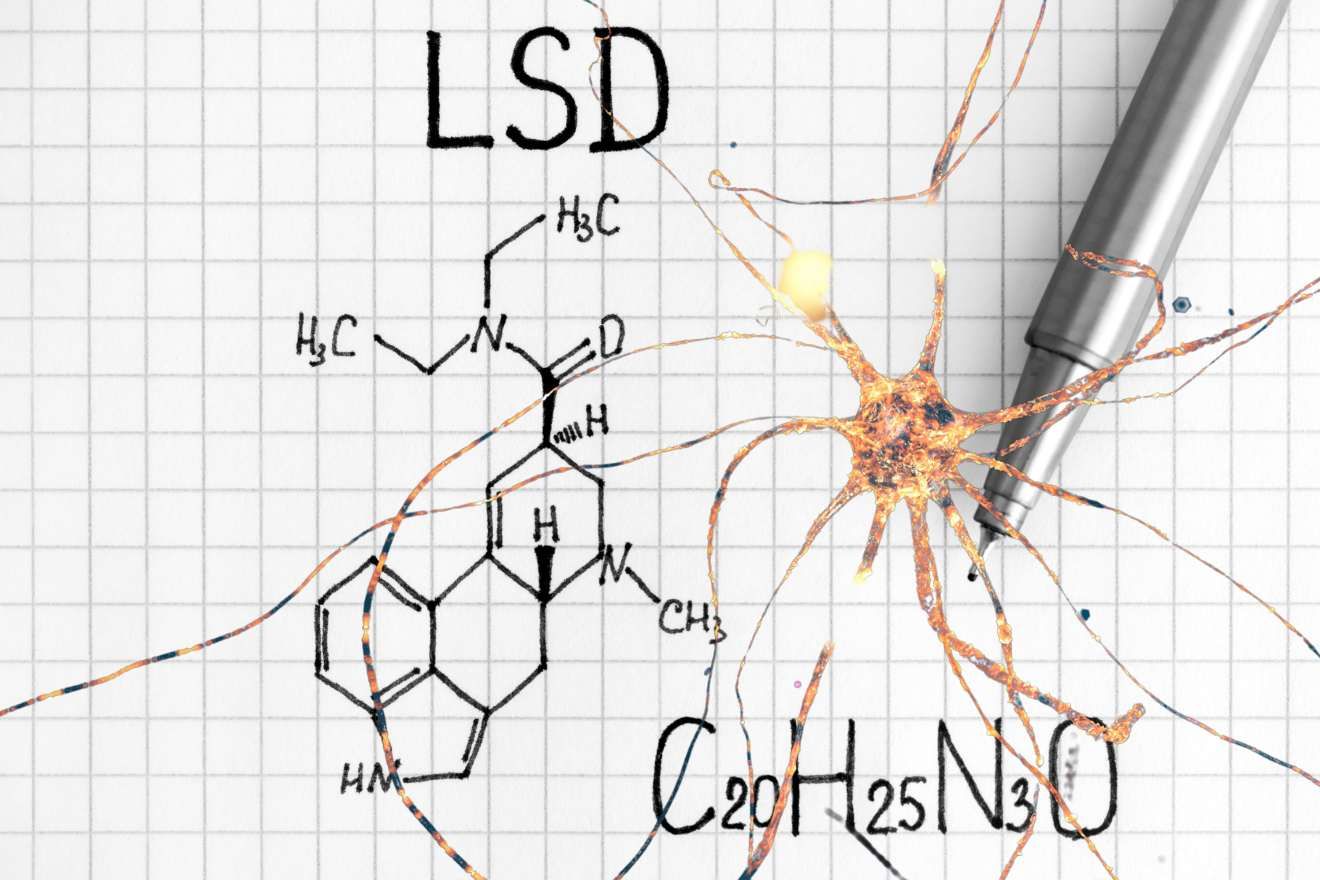LSD (lysergic acid diethylamide-25) is a classic psychedelic that is human-engineered and comes from the fungus that grows on rye or wheat. Albert Hofmann synthesized the substance in 1938; therefore, compared to other classic psychedelics, LSD is relatively young.
Dating back to the 1950s, LSD—a non-selective serotonin 2A (5-HT2A) receptor agonist—has been shown to have therapeutic effects on various mental disorders. Particularly, some studies are showing that it can also enhance the human experience by improving our learning potential.
Read on to learn more about the current research on LSD’s effect on enhancing human learning.
Classic Conditioning of the Rabbit Nictitating Membrane Response
Classical conditioning is a fundamental concept in behavioral psychology. Researchers Ivan Pavlov and Calvin Hall showed that animals could learn to associate a neutral stimulus—also known as the conditioned stimulus (CS)—with an unconditioned stimulus (UCS), leading to a conditioned response.
The nictitating membrane response in rabbits demonstrates how a simple reflexive behavior can be conditioned and altered through repeated stimuli pairings.
The nictitating membrane, also known as the third eyelid, is a thin membrane covering the rabbit’s eye that can be extended and retracted (blinking). In the context of classical conditioning, the UCS is typically a puff of air directed at the rabbit’s eye, which would cause blinking as a protective response. Specifically, a tone or a light is often used as the CS.
Through repeated pairings of the CS and the UCS, the rabbit begins to associate the CS with the impending puff of air. Over time, the previously neutral CS elicits a conditioned response (blinking)— even in the absence of the actual air puff.
Certainly, this experiment highlights the principles of classical conditioning, where the learned association between the CS and the UCS leads to a change in behavior. The rabbit’s nictitating membrane response becomes a conditioned reflex, demonstrating the adaptability of animals to their environment and their ability to learn through association.
This research has contributed to our understanding of learning processes. Not only that, it has paved the way for further investigations into the complexities of behavior and conditioning across various species.
LSD and Rabbit Nictitating Membrane Response
A 1979 study looked at the effects of LSD and learning as measured by classical conditioning of the rabbit nictinic membrane response.
Tone and light presented 800 milliseconds before the UCS was used as CS. The UCS was the administration of a 100-millisecond electric shock to the skin over the paraorbital region of the head.
Responses were categorized as the following:
- Conditioned Response (CR): Blinking (extension of the membrane) in response to CS within 800 milliseconds
- Unconditioned Response (UCR): Blinking upon shock initiation
LSD was intravenously injected (1, 10, 30, 100, or 300 nmol/kg) 30 minutes before each daily conditioning session. Dosages ranging from 1 to 100 nmol/kg of LSD showed a progressive improvement in CR acquisition. This group was able to achieve 10 successive CRs in 184 trials at 30 nmol/kg of LSD. The control group required 293 trials.
LSD’s Impact on Learning Verified
Separate groups of rabbits received only one stimulus (tone alone, light alone, or shock alone). The results showed that the proportion of responses either within 800 milliseconds of CS onset or prior to shock onset was minimal (2–3%); LSD dosage did not impact this observation. This indicated that the effect of LSD on acquisition was not attributed to sensitization, pseudoconditioning, or shifts in baseline responding.
The study concluded that the systematic effects of LSD on the acquisition of CRs can be attributed to the drug’s impact on learning.
Accelerated Learning Potentially Due to LSD Desensitization of the 5-HT2A Receptor
A 2010 study looked at the effect of intrahippocampal LSD on the 5-HT2A receptor in rabbits. The researcher’s rationale was that injecting LSD, a serotonin 5-HT2A receptor agonist, intravenously enhances eyeblink conditioning. (±)-1(2, 5-dimethoxy-4-iodophenyl)-2-aminopropane hydrochloride (DOI) can also trigger a 5-HT2A-mediated behavior (head bobs) after injection into the hippocampus.
The study aimed to understand the following:
- Will parenteral injections of hallucinogens LSD, d,l-2,5-dimethoxy-4-methylamphetamine, and 5-methoxy-dimethyltryptamine induce the 5-HT2A-mediated behavior of head bobs?
- Will intrahippocampal LSD injections lead to head bobs and an improvement in trace eyeblink conditioning?
Before each of the eight conditioning sessions, LSD was infused into the dorsal hippocampus of the rabbits. A day after the last LSD infusion, DOI was hippocampally infused. This was to assess potential 5-HT2A receptor desensitization, indicated by reduced DOI-elicited head bobs.
The study results showed that both acute parenteral and intrahippocampal LSD administration induced a 5-HT2A-mediated behavior. However, 5-HT2C did not induce such behavior. Chronic use, on the other hand, increased conditioned responses compared to controls. Rabbits infused chronically with 3 or 10 nmol per side of LSD during Pavlovian conditioning and later infused with DOI showed a relatively smaller increase in head bobs compared to controls.
The researchers concluded that the enhancement of Pavlovian conditioning by LSD primarily stems from its influence on 5-HT2A receptors within the dorsal hippocampus. The moderate, temporary learning acceleration from LSD seems to be associated with the desensitization of the 5-HT2A receptor within the hippocampus due to repeated agonist (LSD) administration.
Nootropic Effects of LSD
A 2022 study looked at behavioral, molecular, and computational evidence for the nootropic effects of LSD. Nootropic drugs are those that are used to enhance memory or other cognitive functions.
Previous research conducted on rodents showed that LSD can enhance neural plasticity through the activation of the mTOR pathway. This pathway is a main regulator of metabolism, plasticity, and aging.
The researchers used brain organoids to examine the effects of LSD at the cellular level. They found that it influenced processes including mTOR signaling, neural pathfinding, and DNA replication.
A novel object preference task involving 76 rats was conducted to investigate the impact of LSD on memory processes linked to the hippocampus. This was carried out a few days after administering either a dose of LSD or saline solution.
LSD Increases Novelty-Seeking Behavior
The results showed that the rats that had received LSD showed a tendency to dedicate more time to exploring novel objects. However, it seemed that LSD did not influence the overall duration of object exploration. These researchers suggest that LSD-induced plasticity is associated with an increased tendency toward novelty-seeking.
The researchers also looked at the effects of LSD on memory. This was done by conducting a randomized, double-blind, placebo-controlled study in human subjects. 25 healthy volunteers with prior LSD experience were administered 50 μg of LSD in one session and a 50 μg inactive placebo in another session.
LSD Potentially Promotes Neuroplasticity
On the morning following each dosing, participants were asked to perform memory tests. The research findings indicated that participants had an improved performance on memory tests the day after LSD consumption, as compared to the day after taking the placebo.
The study’s author is Sidarta Ribeiro, a full professor of neuroscience at the Brain Institute of the Federal University of Rio Grande do Norte. Ribeiro shared with PsyPost that although the results showed that LSD has the potential to promote neural plasticity and enhance cognition in healthy adults, “we still need to learn more about age differences, potential gender differences, and the role of the context (setting) in the modulation of the effects.”
LSD and Critical Periods of Learning
The critical period of learning refers to a specific developmental phase during which the brain is particularly sensitive to external stimuli and experiences. This sensitivity enables rapid and efficient acquisition of specific skills or knowledge.
This window of increased plasticity allows for optimal learning and adaptation, often associated with essential functions such as language acquisition, motor skill development, and sensory processing. Once the critical period ends, neural circuits become less receptive to new information, making it harder to learn certain abilities or behaviors.
LSD Potentially Opens Critical Periods for Social Learning
A 2023 study looked at how LSD can potentially reopen critical periods, offering insights into brain plasticity and opportunities for therapeutic interventions. The researchers examined the potential of five psychedelic drugs — ibogaine, ketamine, LSD, MDMA, and psilocybin . Each of these has been shown to alter perceptions and enable self-discovery.
The study conducted behavior tests on adult male mice to assess how they learn from their social environments. The researchers observed their responses to the drugs in different social contexts (by themselves or with social interactions). They identified the varying durations for which the critical period remained open. This indicated that the effect enabled them to learn the value of a social environment, which is typically learned during adolescence.
The results showed the following durations in which the critical periods of social reward learning remained open for each drug:
- Ketamine: 48 hours
- Psilocybin: Two weeks
- MDMA: Two weeks
- LSD: Three weeks
- Ibogaine: Four weeks
LSD’s Potential Role In Post-Treatment Integration
One of the study authors is Gül Dölen, M.D., Ph.D., an associate professor of neuroscience at the Johns Hopkins University School of Medicine. Dölen shared the following with Johns Hopkins Medicine:
“This relationship gives us another clue that the duration of psychedelic drugs’ acute effects may be the reason why each drug may have longer or shorter effects on opening the critical period.
The open state of the critical period may be an opportunity for a post-treatment integration period to maintain the learning state.
Too often, after having a procedure or treatment, people go back to their chaotic, busy lives that can be overwhelming. Clinicians may want to consider the time period after a psychedelic drug dose as a time to heal and learn, much like we do for open heart surgery.”
Furthermore, the study examined the molecular mechanisms underlying the effects of these drugs. They discovered that while serotonin receptor activation is involved in opening the critical period for LSD and psilocybin, MDMA, ibogaine, and ketamine operate through different mechanisms.
Additionally, the researchers investigated ribonucleic acid (RNA), a molecule akin to DNA. This was in order to understand gene expression changes during and after the critical period. They found variations in the expression of around 65 genes linked to proteins responsible for maintaining or repairing the extracellular matrix. The extracellular matrix is a scaffolding structure that surrounds brain cells located in the nucleus accumbens. The nucleus accumbens is an area responsible for reward-responsive social learning behaviors.
LSD and Learning Reinforcement in Humans
A study published in 2022 looked at the effect of LSD on reinforcement learning in humans. Specifically, it aimed to explore the influence of LSD on probabilistic reversal learning (PRL) in healthy individuals.
The researchers used a within-subjects design. 19 healthy volunteers over the age of 21 were administered intravenous LSD (75 μg in 10 mL saline) or placebo (10 mL saline) and underwent a PRL task. Participants engaged in trial and error to identify the most frequently rewarded among three visual stimuli.
The initial half of the task contained one of the stimuli that had positive feedback in 75% of instances. Another stimulus had positive feedback in 50% of instances, and the third had positive feedback in merely 25% of instances.
Following 40 trials, the likelihoods associated with each stimulus were reversed. The stimulus that previously led to correct responses 75% of the time was now associated with accurate responses only 25% of the time, and vice versa.
Computational models of reinforcement learning (RL) were applied to the behavioral data. This was in order to assess the impact of LSD on the following:
- Updating (learning rates)
- Deployment of value representations during choice (reinforcement sensitivity)
- Stimulus stickiness (choice repetition irrespective of reinforcement history)
LSD Associated With Quicker Learning Ability in Human Subjects
The results showed that immediate feedback sensitivity indicators (‘win-stay’ and ‘lose-shift’ probabilities) remained unaffected by raw data measures. Still, LSD improved the impact of initial learning strength on perseveration.
This meant that the administration of LSD resulted in an accelerated rate of participants’ adjustment of their expectations according to received feedback. This implies that individuals who were administered LSD displayed a quicker learning ability compared to those who were given a placebo.
Computational modeling highlighted that LSD’s most significant effect was increasing reward learning rates and punishment learning rates. Specifically, learning from rewards had a significantly greater effect than from penalties.
Potential Benefits of LSD In Treating Mental Illnesses
The study author Jonathan Kanen, a Gates Cambridge Scholar, spoke with PsyPost about LSD enhancing the learning process:
“When something better than expected happens to us, the brain updates our expectations or beliefs about whether something good might happen again if we do the same thing. LSD boosted how rapidly expectations are updated, particularly after better-than-expected outcomes. This indicates that LSD may make the brain more changeable. These results could be relevant to its potential beneficial effects for people with certain mental illnesses.”
The results also showed that LSD reduced stimulus stickiness, indicating heightened exploratory behavior. This meant the LSD recipients were more open and willing to experiment with novel choices during decision-making.
The study concluded that the observed increased reinforcement learning rates following LSD administration suggest an enhanced state of plasticity induced by the substance.
Future Research Directions
Kanen shared his thoughts on future directions of research on the effect of LSD and learning:
“An open question is whether these effects of LSD on learning help us understand how to optimize treatments involving psychedelic drugs. We studied learning right after administration of LSD — do these effects on learning and flexibility persist after the drug wears off? Whether these effects of LSD generalize to other psychedelic drugs such as psilocybin remains to be tested.”
Therefore, research suggests that LSD may have the potential to enhance learning under certain conditions. Studies conducted on rodents and humans have indicated that LSD could influence neural plasticity, which is the brain’s ability to adapt and form new connections.
However, it’s important to note that the effects of LSD on learning are complex and can vary depending on factors such as dosage, timing, and individual differences. Additionally, the use of LSD for cognitive enhancement is still an area of ongoing research and discussion.
Learn more by taking our course: Exploring Psychedelics: Discovery, Research & Effects
Follow your Curiosity
Sign up to receive our free psychedelic courses, 45 page eBook, and special offers delivered to your inbox.References
Nardou, R., Sawyer, E., Song, Y. J., Wilkinson, M., Padovan-Hernandez, Y., de Deus, J. L., Wright, N., Lama, C., Faltin, S., Goff, L. A., Stein-O’Brien, G. L., & Dölen, G. (2023). Psychedelics reopen the social reward learning critical period. Nature, 1–9. https://doi.org/10.1038/s41586-023-06204-3
Romano, A. G., Quinn, J. L., Li, L., Dave, K. D., Schindler, E. A., Aloyo, V. J., & Harvey, J. A. (2010). Intrahippocampal LSD accelerates learning and desensitizes the 5-HT2A receptor in the rabbit, Romano et al. Psychopharmacology, 212(3), 441–448. https://doi.org/10.1007/s00213-010-2004-7
Classic Conditioning of the Rabbit Nictitating Membrane Response
Rehman, I., Mahabadi, N., & Rehman, C. I. (2022, August 22). Classical Conditioning. Nih.gov; StatPearls Publishing. https://www.ncbi.nlm.nih.gov/books/NBK470326/
Gimpl, M. P., Gormezano, I., & Harvey, J. A. (1979). Effects of LSD on learning as measured by classical conditioning of the rabbit nictitating membrane response. Journal of Pharmacology and Experimental Therapeutics, 208(2), 330–334. https://jpet.aspetjournals.org/content/208/2/330.short
Nootropic Effects of LSD
Ornelas, I. M., Cini, F. A., Wießner, I., Marcos, E., Araújo, D. B., Goto-Silva, L., Nascimento, J., Silva, S. R. B., Costa, M. N., Falchi, M., Olivieri, R., Palhano-Fontes, F., Sequerra, E., Martins-de-Souza, D., Feilding, A., Rennó-Costa, C., Tófoli, L. F., Rehen, S. K., & Ribeiro, S. (2022). Nootropic effects of LSD: Behavioral, molecular and computational evidence. Experimental Neurology, 356, 114148. https://doi.org/10.1016/j.expneurol.2022.114148
Dolan, E. W. (2022, August 11). Neuroscience research suggests LSD might enhance learning and memory by promoting brain plasticity. PsyPost. https://www.psypost.org/2022/08/neuroscience-research-suggests-lsd-might-enhance-learning-and-memory-by-promoting-brain-plasticity-63701
LSD and Critical Periods of Learning
The Johns Hopkins University. (2023, June 14). Study Shows Psychedelic Drugs Reopen “Critical Periods” for Social Learning. Johns Hopkins Medicine Newsroom. https://www.hopkinsmedicine.org/news/newsroom/news-releases/study-shows-psychedelic-drugs-reopen-critical-periods-for-social-learning
LSD and Learning Reinforcement in Humans
Kanen, J. W., Luo, Q., Kandroodi, M. R., Cardinal, R. N., Robbins, T. W., Nutt, D. J., Carhart-Harris, R. L., & Ouden, H. E. M. den. (2022). Effect of lysergic acid diethylamide (LSD) on reinforcement learning in humans. Psychological Medicine, 1–12. https://doi.org/10.1017/S0033291722002963
Dolan, E. W. (2023, May 6). LSD enhances learning and exploratory behavior in humans, according to new placebo-controlled research. PsyPost. https://www.psypost.org/2023/05/lsd-enhances-learning-and-exploratory-behavior-in-humans-according-to-new-placebo-controlled-research-80417







